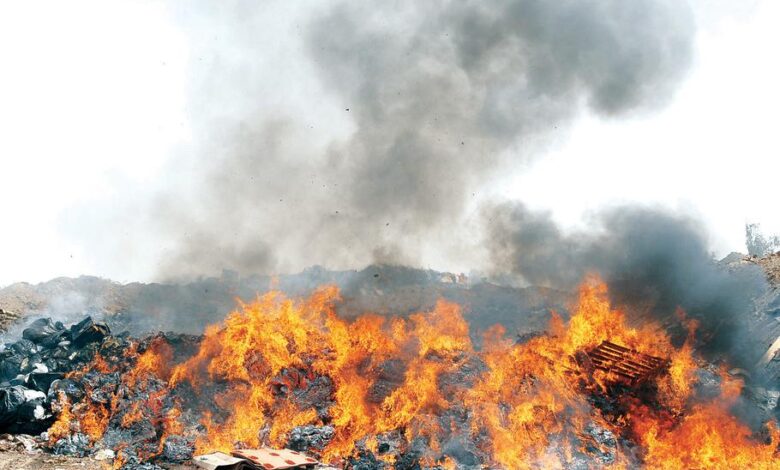Health Risks and Legal Struggles: The Impact of Burn Pits on Veterans

Table of Contents
- What Are Burn Pits?
- Health Implications of Burn Pits
- Veterans Facing Legal Challenges
- Current Legislation and Support
- Ways to Protect Your Health
- Resources for Veterans
Burn pits expose veterans to harmful chemicals, leading to respiratory issues, cancers, and other health risks. Legal struggles include proving service connections and obtaining VA benefits. Advocacy and awareness are crucial for addressing medical needs and securing compensation for affected veterans, highlighting the ongoing impact of burn pit exposure.
What Are Burn Pits?
Burn pits are large open-air areas employed by the military to dispose of waste materials through burning. These pits were extensively utilized in conflict zones such as Iraq and Afghanistan. Typical materials burned in these pits include chemicals, paint, medical waste, and everyday garbage. The open-air burning method releases many pollutants and hazardous materials into the air, making the environment highly toxic.
Many veterans are now dealing with long-lasting health issues due to their exposure to burn pits. What are the 23 presumptive conditions for burn pit exposure? It’s critical to comprehend the possible health hazards linked to these pollutants and the continuous struggles many veterans endure to receive the medical attention and legal assistance they need. Understanding the nature of these pits and the extent of their use helps comprehend the scale of the problem and the number of individuals potentially affected.
Health Implications of Burn Pits
The toxic fumes generated by burn pits have been linked to numerous severe health issues. Reports and studies have indicated a disturbing correlation between exposure to burn pits and respiratory problems, cancers, and other severe ailments. The smoke contains a mix of harmful chemicals and particulate matter, which, when inhaled, can lead to chronic respiratory diseases, cardiovascular problems, and various forms of cancer. These health issues can manifest years after the initial exposure, making diagnosis and treatment more complex.
Recent research from institutions focusing on veteran health has provided evidence supporting these claims. The studies underscore how critical it is for affected veterans to seek medical evaluation and treatment, even if symptoms appear years after their service. The delay in manifesting symptoms often results in misdiagnosis or late diagnosis, complicating treatment options and recovery. Therefore, veterans must remain vigilant about their health and seek regular medical check-ups to identify potential issues early on.
Veterans Facing Legal Challenges
Many veterans exposed to burn pits struggle with more than just medical problems; they often face significant legal challenges in accessing compensation and healthcare. The path to proving that their health conditions are directly related to burn pit exposure can be fraught with difficulties. Veterans must typically provide detailed evidence, which can be time-consuming and emotionally taxing. This evidence often includes medical records, expert testimonials, and sometimes even personal testimonies, which can be hard to compile and present effectively.
Moreover, legal battles for compensation can be lengthy, involving numerous bureaucratic hurdles and sometimes requiring expert testimony to establish the connection between burn pit exposure and the veteran’s health issues. This situation often leaves veterans in a state of limbo, with mounting healthcare costs and limited support. The legal system’s complexity and the high burden of proof usually discourage veterans from pursuing their claims, leading to underreporting and a lack of adequate support for those in need.
Current Legislation and Support
Several legislative efforts have been aimed at improving support for veterans affected by burn pits. Recent bills have sought to address healthcare and compensation needs more comprehensively. For instance, introducing new healthcare bills explicitly targeted at providing better medical and financial support has been a welcome move. However, many argue that more needs to be done to ensure all affected veterans receive the care they deserve. Legislative changes often take time, leaving many veterans needing immediate help.
According to an NBC News report, ongoing legislative efforts are crucial in warning about the risks and advocating for better conditions for veterans. The report highlights the persistent dangers and the need for continuous legislative attention. Additionally, as reported by CNN, the health care bill for veterans exposed to burn pits marks a significant step in the right direction. This bill aims to provide comprehensive healthcare benefits to affected veterans, ensuring they receive medical care without excessive costs.
Ways to Protect Your Health
- Regular medical check-ups: Early detection of health issues can lead to better outcomes. Schedule regular check-ups, explicitly focusing on respiratory and cardiovascular health. These examinations can assist in spotting early illness symptoms and enable prompt treatment.
- Utilize VA resources: The VA provides various resources aimed at veterans exposed to burn pits. Take advantage of these resources for medical advice, screenings, and possible treatments. The VA offers specialized programs and clinics that cater to veterans’ needs, providing them with the care they need based on their specific exposure history.
- Stay informed about your rights: Knowledge is power. Keep abreast of recent legislative modifications and news about burn pits and veterans’ health. This information can be crucial in legal battles for compensation and healthcare. It may significantly impact the outcome of your claims and ensure you get the help you require if you know your rights and the available resources.
Resources for Veterans
Many organizations and online resources are dedicated to supporting veterans affected by burn pits. These resources offer educational information, support groups, and legal assistance. Educational resources provide detailed information about burn pits, their health implications, and ways to mitigate risks. Support groups offer emotional and psychological support, allowing veterans to connect with others with similar experiences.
Veterans may locate forums and groups to exchange stories, learn from one another, and get emotional support from those who have been through similar hardships. Legal aid organizations also provide invaluable assistance for those navigating the complex terrain of compensation claims and healthcare access. These organizations can help veterans compile necessary documentation, provide legal counsel, and represent them in legal proceedings, ensuring they have the best possible chance of success in their claims.




